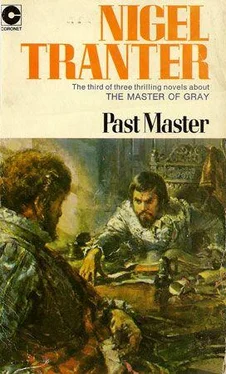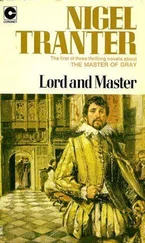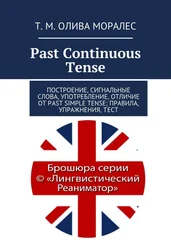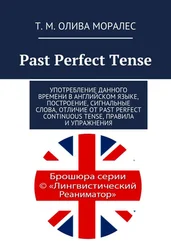Nigel Tranter - Past Master
Здесь есть возможность читать онлайн «Nigel Tranter - Past Master» весь текст электронной книги совершенно бесплатно (целиком полную версию без сокращений). В некоторых случаях можно слушать аудио, скачать через торрент в формате fb2 и присутствует краткое содержание. Жанр: Исторические приключения, на английском языке. Описание произведения, (предисловие) а так же отзывы посетителей доступны на портале библиотеки ЛибКат.
- Название:Past Master
- Автор:
- Жанр:
- Год:неизвестен
- ISBN:нет данных
- Рейтинг книги:5 / 5. Голосов: 1
-
Избранное:Добавить в избранное
- Отзывы:
-
Ваша оценка:
- 100
- 1
- 2
- 3
- 4
- 5
Past Master: краткое содержание, описание и аннотация
Предлагаем к чтению аннотацию, описание, краткое содержание или предисловие (зависит от того, что написал сам автор книги «Past Master»). Если вы не нашли необходимую информацию о книге — напишите в комментариях, мы постараемся отыскать её.
Past Master — читать онлайн бесплатно полную книгу (весь текст) целиком
Ниже представлен текст книги, разбитый по страницам. Система сохранения места последней прочитанной страницы, позволяет с удобством читать онлайн бесплатно книгу «Past Master», без необходимости каждый раз заново искать на чём Вы остановились. Поставьте закладку, и сможете в любой момент перейти на страницу, на которой закончили чтение.
Интервал:
Закладка:
This straggling multitude progressed – since it could hardly be said to march – in a general northerly direction, by way of the Abbey Hill, the flanks of Calton Hill, the village of Moutrie, the Gallow's hill where the bodies of offenders hung in chains, and on down the long straight track of Leith Loan past the hamlet of Pilrig and the outskirts of Logan's property of Restal-rig. The bare two miles took the best part of two hours to cover, largely because of the desperately slow pace of the plodding oxen drawing the heavy cannon over the churned-up mud of the uneven route. Indeed, the impatient apprentices, who started by helping to push the lumbering artillery at bad patches, presently took over from the oxen altogether, and the last part of the journey was completed at a slightly better pace. By which time the entire incoherent column had spread and strung itself out sufficiently to make it barely recognisable as a unified force.
The Kennedy outriders kept the leadership posted as to the situation ahead. Quite early on scouts came back with the word that Bothwell, after taking Leith with little or no resistance – for the town walls, once stronger than those of Edinburgh itself, had been broken down during the religious wars of Queen Mary's reign and never rebuilt – had now moved out of the port itself to the east, to take up a defensive position amongst the fortifications in the open area outside the town known as Leith Links. Later information confirmed that he was still there.
The news could be both good and bad. He was evidently not sallying forth to challenge the King's force; on die other hand, he was not retreating – and these fortifications, earthworks thrown up to protect Leith and the Capital from an expected English landing by sea fifty years before, were defensively very powerful.
As the leaders of the royal force neared the broken walls of Leith, James became ever more agitated. He was a good horseman, strangely enough, although his slouching seat was deceptive, but, though twice die man mounted that he was on his shambling feet, he was still no warrior-king. Without Patrick Gray at his side to sustain him, and unappreciative of Morton's bellicose confidence, he kept looking back wistfully, most clearly desiring to be elsewhere. Ludovick Lennox presently fell behind to speak to the Master, to declare that if he did not come forward to take the King in hand again, there was likely to be a crisis.
So, his usually immaculate appearance notably soiled and mud-spattered, Patrick took to horse once more and resumed his nursing of the monarch's slender militancy.
In sight of the town's belatedly closed gates and gapped walls, they swung away right-handed, eastwards. They could see the green mounds of the earthworks on the Links, now, about half-a-mile away, between them and the sea. A few figures could be distinguished on the summits of the ramparts, but there was no sign of an army. Bothwell's troops could be hidden behind the grassy banks easily enough.
The King's relief at not being able to see his enemy was comic. Patrick was more concerned at not being able to see the sea, which the banks and the town between them hid.
'We must send a party to keep watch from the Signal Tower, Sire,' he declared. The environs of Leigh were flat, with no hills to offer vantage-points, and a tall watch-tower was a prominent feature of the harbour works, for observing the approach of shipping. 'If Bothwell is waiting here, it may well be to help in the landing of a force coming by sea. We must be warned of any such.'
'Aye, Patrick – Aye.' James obviously had an idea. 'I could do that, man. / could watch in the auld Signal Tower. Fine I could. And keep you informed here…'
'No doubt, Sire. But your royal presence with this host is entirely necessary. All would be at each others' throats without you, I fear – or away home to Edinburgh! Others we can spare -not the King!'
Silent, James rode on.
They were about four hundred yards from the first of the ramparts when the scene was suddenly and most dramatically transformed. All along the summit of that lengthy line of earthworks horsemen appeared, in a well-concerted movement, to stand there, side by side, upright lances glistening in the sun, pennons fluttering. The line was only one man deep but it was almost half-a-mile long, and the effect was impressive in the extreme – and daunting to more than King James. The advance of the royal horde came to a ragged halt.
Seeking to soothe the sovereign's near panic, Patrick pointed out that there was no immediate danger. The ground between the forces was cut and scored by trenches and holes, out of which the soil for the ramparts had been dug – now mostly filled with water. No cavalry charge across this was a practical proposition, from either side. Bothwell could not come at them, in his present formation, any more than they could get at him -save with footmen, who were certainly not likely to be anxious to throw away their lives in any head-on assault. And the range was too great for musketry. They had one advantage, however, denied to Bothwell. They had artillery. When the cannon came up, the situation would be changed.
Only slightly reassured, James was in a fret for the arrival of the guns. Confusion prevailed along the royal line – if line it could be termed. Some bold spirits pressed forward, to shake weapons and fists at the long still array of horsemen quarter-of-a-mile away – but more pressed back. There was a deal of shouting, some unauthorised and wild musket-fire, and considerable prayer, both offensive and defensive. Morton, without consulting anyone else, ordered his Douglas horsemen into a spectacular earth-shaking, lance-shaking, gallop, up and down the front, back and forward, shouting slogans, banners flying -but not coming within three hundred yards of die enemy. The main mass of townsmen, still coming up, kept pushing in amongst those in front, and then, discovering the situation, pushing back again.
In contrast to these highly mobile and fluid tactics, the enemy remained rather alarmingly motionless, grimly sure of themselves. Only in the centre of the long front was diere any movement at all, where, under the red and white banner of Hepburn a small group of dismounted men were clustered.
Kennedy of Bargany, a stocky, bull-necked middle-aged man, and veteran of innumerable feuding affrays in his own lawless Carrick, rode up to Patrick, and after hooting his contempt of the King's force in general, and disparaging Morton's antics with his Douglases in particular, suggested that he should seek to outflank Bothwell with as much of the cavalry as could be spared. The fortifications ended at the very walls of Leith on the west, and nothing could be done there; but they must peter out somewhere to the east, amongst the open sand-dunes, and the enemy line could be turned from that side.
Patrick agreed – although the riding away of a large part of the cavalry might have a disastrous effect on the foot. On the other hand, to wait there doing nothing in the face of that grim line of moss-troopers was equally bad for morale. Bargany's move might at least cause Bothwell to break his threatening frontal formation.
Andrew Melville, from a consultation with some of his clerical colleagues, came to announce that the shepherds of Christ's Kirk had not marched all this way to stand inactive before die Philistines. The Lord's battles were not won so. Let them advance and come to grips. The Kirk would lead if the King would not.
Both these proposals appalled James. Patrick however saw virtue even in the latter, suitably modified – since almost any action, in the circumstances, was better than this inaction, which was in danger of turning their unwieldy host into a useless panic-stricken mob. Something to keep the crowd interested and occupied, whilst they awaited the cannon, was essential. Any head-on assault would be suicidal – but if part of the cavalry riding off to the east was balanced by a movement of foot to the west, order might be maintained and the impression given of some assured strategy. He urged Melville to lead some portion of his Kirk following in a flanking move to die west, towards the point where these ramparts joined Leith town walls. The said walls were broken and tumbled, and it ought to be possible to infiltrate through the streets and possibly work round the back of the enemy line. This, taken in conjunction with the Kennedy move, should at least worry Bothwell – whilst leaving the front clear for the cannon when at length they could be brought to bear.
Читать дальшеИнтервал:
Закладка:
Похожие книги на «Past Master»
Представляем Вашему вниманию похожие книги на «Past Master» списком для выбора. Мы отобрали схожую по названию и смыслу литературу в надежде предоставить читателям больше вариантов отыскать новые, интересные, ещё непрочитанные произведения.
Обсуждение, отзывы о книге «Past Master» и просто собственные мнения читателей. Оставьте ваши комментарии, напишите, что Вы думаете о произведении, его смысле или главных героях. Укажите что конкретно понравилось, а что нет, и почему Вы так считаете.












